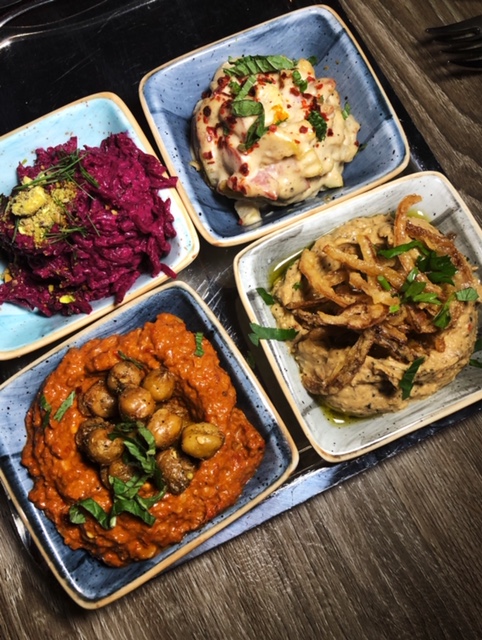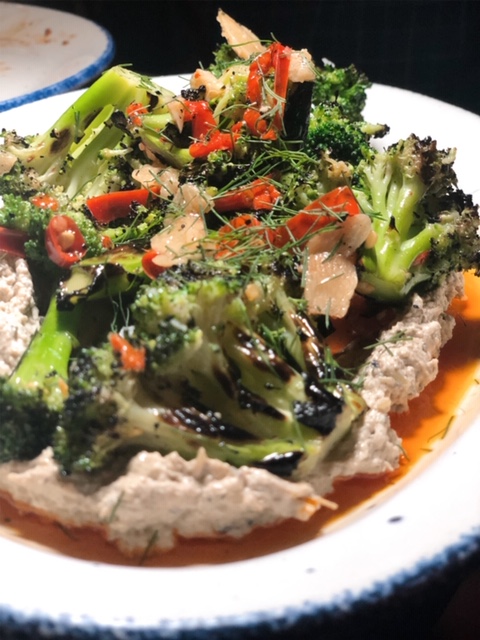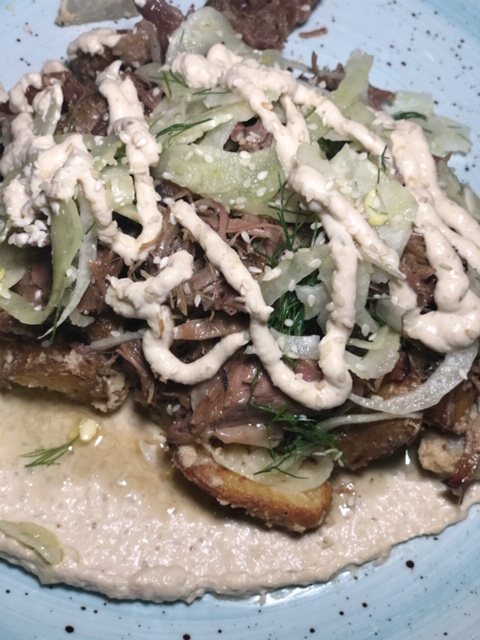If there is one ingredient that is woven consistently into the food at Sababa, the one-year old Israeli restaurant in Cleveland Park, it’s tahini. The creamy sesame paste that is akin to peanut butter is a common ingredient in Middle Eastern dishes and is a staple in Israeli cuisine.
Ryan Moore, executive chef at Sababa, uses 120 pounds of tahini every week. His tahini of choice is produced by Soom Foods, a decision that didn’t come to him easily.
“Prior to opening I tried every tahini I could get, and I found Soom to be the best,” says the chef. “And I saw their mission and they were from the area, single-sourced origin, a small business, and those were the people I wanted to support. Plus, they had the best product.”
Moore and the Sababa team – including manager Brett Carnahan, who came up with the idea -took the partnership with Soom Foods to the next level by hosting a recent collaboration dinner. Moore composed nine dishes plus a variety of salatim (salad and dips) all infused with Soom tahini. Many of the dishes – or a slight variation- are featured on Sababa’s menu. The dinner showcased the synergy between ingredients, the fusion that is Israeli cuisine, and the significant relationship between restaurateur, chef, and producer.
Sababa is part of the Knightbridge Restaurant Group founded by Ashok Bajaj. The restaurateur is the highly-regarded owner of Rasika, Bindaas, Bombay Club, Oval Room, Bibiana, and others. The restaurants feature a variety of cuisines that range from Indian to Italian to Mediterranean. This is the first full service restaurant in the area that is focused solely on Israeli food. Moore says that Bajaj’s original plan was to open a Mediterranean restaurant, but the concept for Sababa evolved.
“Israeli food is the culmination of the Mediterranean, Middle East, North Africa, Eastern Europe- all over really- and it gives you the freedom to find your own path and true identity,” he says. Moore and Bajaj wanted vegetables and grains to have a prominent place on the menu, which further solidified the idea for an Israeli restaurant.
The chef’s training makes him well-suited to the conflation of cuisines that influence Israeli food. In DC Moore has worked alongside Jose Andres at MiniBar and Zaytinya, Ris Lacoste at Ris, RJ Cooper at Rogue 24, Katsuya Fukushima at Daikaya, and Yannik Cam at Bistro Provence. He’s traveled extensively to Egypt and also lived in the United Arab Emirates, which further sparked his interest in the flavors and techniques associated with the region.
To help launch the restaurant, several Israeli chefs were brought in to impart their expertise, and Moore spent a week with award-winning chef Michael Solomonov at his Philadelphia restaurant Zahav.
Moore infuses his training, travels, and experience into the dishes at Sababa. “I love using the spices,” he tells me excitedly. “I’m blessed with having Bindaas next door and working out of the same kitchen. We have access to really good spices… so being privy to very fresh cumin, garlic, cloves, turmeric, and fenugreek makes a big difference.”
In Israel it’s common to commence a meal with salatim. It’s a must at Sababa. The Soom collaboration dinner salatim includes a bright beetroot relish with tahini and pistachio, as well as roasted charred carrot with date tahini.

The most common use for tahini is in hummus. Moore has labored over the ratio of ingredients and says his version has more tahini than most. Thanks in part to Soom, his hummus shines with its rich texture and buttery flavor. He offers a hummus of the day, which gives him an opportunity to play with spices and other elements.
The pita is made in-house. It’s thick, fluffy, and very filling. I use it sparingly as a vehicle for the salatim, preferring to save room for vegetables and proteins. Resistance is optional.
Grilled broccoli with roasted garlic and chili oil charred broccoli tahini exemplifies the chef’s commitment to “trash cooking.” This is a trend that addresses the issue of food waste. Moore repurposes his ingredients so that stems, seeds, vegetable peels and other typical throwaways are pickled or fermented to add complexity to sauces and dips. They can also be incorporated into charcoal for grilling.

Look for the menu to change with the seasons but charred eggplant with herbed labne, pomegranate and pistachios isn’t going anywhere, promises the chef. It’s one of the restaurant’s most popular dishes.
Fried cauliflower with tahini, golden raisins, dill and lemon doesn’t stray far from a dish found on many Mediterranean menus. For something a little more unique there is carrot falafel with herbed tahini and radish salad.
Sababa’s regular menu includes a smattering of kebabs ranging from salmon with pomegranate-labne marinade to lamb and beef kofta. Harissa-marinated chicken thighs will satisfy heat seekers.
Large plates include whole Mediterranean sea bass roasted in a grape leaf, and lamb shank with braised red cabbage with date and citrus.
The collaboration dinner featured schmaltz braised lamb with artichoke-lemon tahini and fingerling potatoes. The dish is hearty, tangy, and the meat is oh so succulent – and memorable. This deserves a spot on the menu.

Sababa schmaltz braised lamb
One of my favorite dishes at the Soom dinner is royal trumpet mushrooms slathered with tahini barbecue sauce. There’s heat and sweet and you won’t miss the meat. Labneh marinated chicken thighs (pictured on the left) wore the sauce equally well.

The dinner is filling – and at $65 per person -a terrific value. (If they do it again, and I hope they will, don’t miss it). Dessert is a show-stopper, however, and cannot be ignored.
Tahini is currently finding its way onto dessert menus in many restaurants. Moore weaves it into chocolate halva pot de crème with almond brittle and a drizzle of Soom’s newest product- Silan date syrup. I’ve only recently developed a taste for halva- which is a crumbly confection made from a seed or nut butter. This dessert takes halva to new heights for me.

Sababa will soon add halva carved tableside to its dessert menu. Moore is working with Hebel & Co., a small Los Angeles based company that incorporates Soom tahini into their halva with unique flavors like strawberry almond poppy.
Sababa is slang for cool in Hebrew and Arabic. It’s an appropriate word for a restaurant that reflects culinary collaborations both past and present to reward us with modern Israeli cuisine.

Sababa, 3311 Connecticut Ave NW, Washington, DC 20008
Related Posts
Jerusalem and Tel Aviv: A Gastronomic Visit of Biblical Proportions






Speak Your Mind